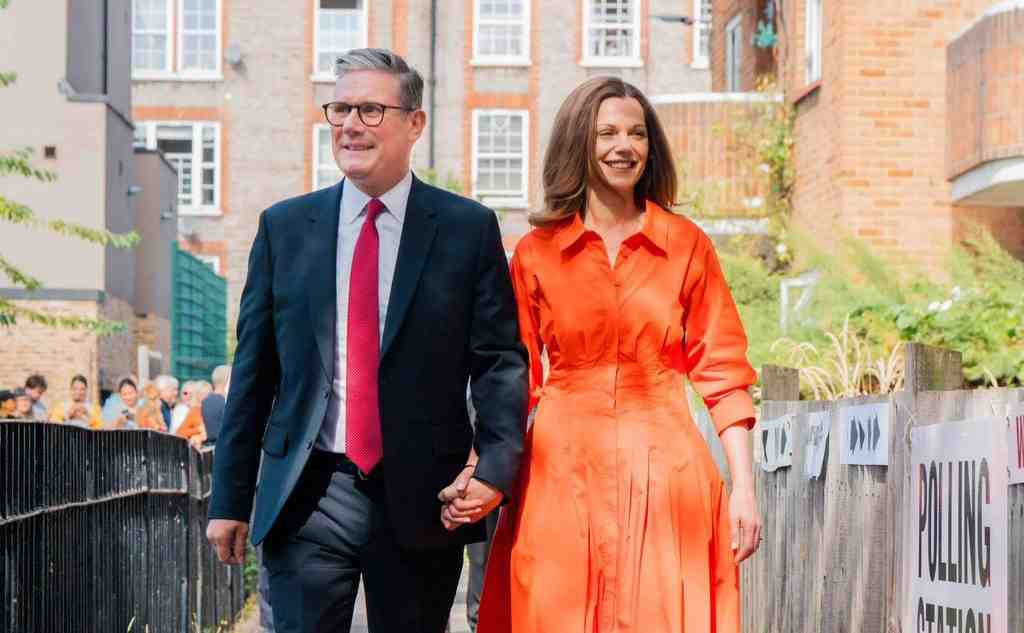Labour leader Keir Starmer assumed the role of prime minister on Friday morning following Rishi Sunak’s resignation before King Charles III.

In a pivotal shift, the United Kingdom has experienced a significant change in leadership as the center-left Labour Party achieved a decisive landslide victory, ending the Conservative Party’s 14-year tenure in a historic defeat.
The electorate’s discontent culminated in a record-breaking loss for the Tories, who had navigated Britain through Brexit. With nearly all results tallied, Labour secured over 400 seats, amassing a substantial majority exceeding 190, reminiscent of Tony Blair’s 1997 triumph. The Conservatives, on the other hand, faced their worst performance since their establishment in the 1830s.
Also Read:- Neil Gaiman Denies Sexual Assault Allegations Amid Police Investigation
Keir Starmer is the new UK Prime Minister
Labour leader Keir Starmer assumed the role of prime minister on Friday morning following Rishi Sunak’s resignation before King Charles III. Starmer subsequently received the monarch’s formal permission to form a new government.
Starmer’s victory marks the first for a Labour leader since Tony Blair. His win is significant as it reflects a centrist progressive triumph amidst the rise of far-right populism in the U.S. and other Western nations. British voters, frustrated by deteriorating public services and prolonged political turmoil post-Brexit, overwhelmingly rejected the Tories.
Since taking the helm of Labour in 2019, Starmer has steered the party back to the center, distancing it from the left-wing influence of former leader Jeremy Corbyn. His campaign focused on ending political chaos and rejuvenating Britain’s services and infrastructure, while pledging to move away from divisive cultural debates, including Brexit.
Meanwhile, the Conservative Party is grappling with what one senior member described as an “electoral apocalypse.” Many prominent Tory figures, including numerous cabinet ministers and former Prime Minister Liz Truss, lost their seats. Even key Brexit advocate Jacob Rees-Mogg was ousted. Though outgoing Prime Minister Rishi Sunak retained his seat, his campaign was fraught with missteps, including an ill-timed return from D-Day commemorations for a TV interview. Sunak’s brief 18-month tenure concluded the sequence of five consecutive conservative prime ministers since 2016.
Also Read:- Rudy Giuliani Disbarred in New York for Election Fraud Lies, Faces Broad Legal Repercussions
Labour now faces substantial challenges in governing, with the Tories’ downfall partly attributed to the rise of the far-right anti-immigrant Reform Party, led by Nigel Farage, who finally secured a parliamentary seat and drew significant Tory votes.
Despite Labour’s commanding majority, they garnered only around 35% of the popular vote, a record low, indicating a tepid enthusiasm for Starmer despite a strong desire for change.
Starmer confronts the daunting task of addressing Britain’s economic difficulties and strained public finances. Unlike Blair’s era, the current outlook is grim. Starmer has acknowledged the tough road ahead, emphasizing that progress will be gradual and challenging. He has vowed to start work immediately, cutting short parliament’s summer recess to tackle pressing issues such as housing and prison overcrowding.
The tempered promises reflect Britain’s harsh realities but signal a shift from the right-wing populism rising across Europe.
Also Read:- Tech Entrepreneur Rishi Shah Sentenced for Billion-Dollar Fraud in Health Advertising Scheme
